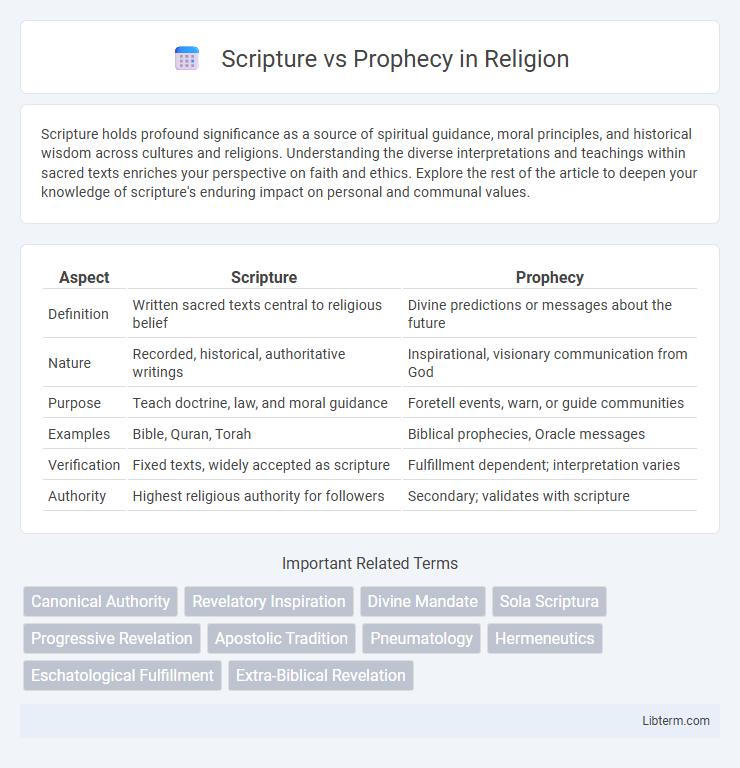Scripture holds profound significance as a source of spiritual guidance, moral principles, and historical wisdom across cultures and religions. Understanding the diverse interpretations and teachings within sacred texts enriches your perspective on faith and ethics. Explore the rest of the article to deepen your knowledge of scripture's enduring impact on personal and communal values.
Table of Comparison
| Aspect | Scripture | Prophecy |
|---|---|---|
| Definition | Written sacred texts central to religious belief | Divine predictions or messages about the future |
| Nature | Recorded, historical, authoritative writings | Inspirational, visionary communication from God |
| Purpose | Teach doctrine, law, and moral guidance | Foretell events, warn, or guide communities |
| Examples | Bible, Quran, Torah | Biblical prophecies, Oracle messages |
| Verification | Fixed texts, widely accepted as scripture | Fulfillment dependent; interpretation varies |
| Authority | Highest religious authority for followers | Secondary; validates with scripture |
Understanding Scripture: Definition and Purpose
Scripture refers to sacred texts considered authoritative and inspired within religious traditions, serving as the foundation for faith, doctrine, and moral guidance. Prophecy, often found within Scripture, involves divinely inspired messages that reveal God's will or predict future events, intended to guide, warn, or encourage believers. Understanding Scripture's definition and purpose involves recognizing its role in conveying spiritual truths, shaping religious identity, and providing a framework for interpreting prophecy within a broader theological context.
What Is Prophecy? Meaning and Significance
Prophecy refers to the divine communication in which a prophet receives and delivers messages or revelations from God, often concerning future events or spiritual truths. It holds significant meaning in religious contexts, serving as guidance, warning, or encouragement to individuals or communities based on the will of a higher power. The significance of prophecy lies in its role as a bridge between the divine and humanity, providing insight, direction, and validation of God's plan throughout sacred texts and traditions.
Key Differences Between Scripture and Prophecy
Scripture consists of sacred writings that form the foundation of religious teachings and doctrines, whereas prophecy involves inspired messages predicting future events or divine will. Scripture is typically a compilation of texts considered authoritative and canonical, while prophecy is often seen as a specific revelation delivered by prophets. Key differences lie in their purpose: scripture provides established guidance and moral laws, whereas prophecy aims to communicate God's intentions or warnings directly to individuals or communities.
Historical Contexts of Scripture and Prophecy
Scripture consists of sacred writings authored and compiled over centuries, reflecting the theological, cultural, and historical contexts of ancient civilizations such as Israel, Babylon, and Egypt. Prophecy emerges within these texts as messages delivered by divinely inspired individuals addressing immediate socio-political challenges, future events, or calls for repentance. Understanding the historical contexts of Scripture and prophecy reveals how prophetic literature often responded to events like the Babylonian exile, offering hope and guidance rooted in historical realities.
Scriptural Foundations for Prophetic Messages
Scriptural foundations for prophetic messages are rooted in biblical texts such as Isaiah 1:1 and Jeremiah 1:4, which establish the divine origin and authority of prophecy. These scriptures emphasize that prophetic messages serve to reveal God's will, provide guidance, and call for repentance. The consistency of prophetic content with established Scripture ensures that true prophecy aligns with biblical truth and divine revelation.
The Role of Prophets in Religious Traditions
Prophets serve as vital messengers in religious traditions, conveying divine revelations that shape scripture and guide spiritual communities. Their role often includes interpreting sacred texts, foretelling future events, and providing moral and ethical direction grounded in perceived divine insight. The intersection of scripture and prophecy underscores the dynamic relationship between recorded divine words and ongoing spiritual communication through chosen individuals.
Interpreting Prophecy in Scriptural Texts
Interpreting prophecy in scriptural texts requires understanding the historical and cultural contexts in which the texts were written, as well as the symbolic language often used by prophets. Accurate exegesis involves analyzing linguistic nuances and thematic patterns that connect prophetic messages with both present circumstances and future expectations. Scholars emphasize the importance of comparing multiple scriptural passages to discern coherent prophetic themes and avoid misinterpretation.
The Authority of Scripture vs. Prophetic Authority
The authority of Scripture is grounded in its divine inspiration, preservation, and role as the final standard for faith and practice, universally recognized within the Christian community. Prophetic authority, while significant, is often contingent upon alignment with established Scripture, serving as a complementary revelation rather than a standalone norm. The supremacy of biblical canon ensures that prophetic messages are evaluated through the lens of scriptural consistency, safeguarding doctrinal integrity and preventing subjective interpretations.
Modern Perspectives on Scripture and Prophecy
Modern perspectives on Scripture and prophecy emphasize the evolving interpretation of sacred texts in contemporary contexts and the role of prophecy as both a spiritual and psychological phenomenon. Scholars analyze Scripture as a dynamic compilation of historical, cultural, and theological narratives, while prophecy is often viewed through lenses of symbolic meaning and social commentary rather than solely predictive revelation. This approach fosters a critical understanding of scriptural authority and prophetic voices within diverse religious traditions.
Harmonizing Scripture and Prophecy in Faith Practice
Harmonizing Scripture and prophecy in faith practice involves interpreting prophetic messages through the established biblical canon, ensuring alignment with doctrinal truths and theological principles. This approach emphasizes the integration of revelatory insights with Scripture's authority to guide ethical conduct and spiritual discernment. Faith communities benefit by validating prophecies against biblical teachings to foster unity and maintain doctrinal coherence.
Scripture Infographic

 libterm.com
libterm.com